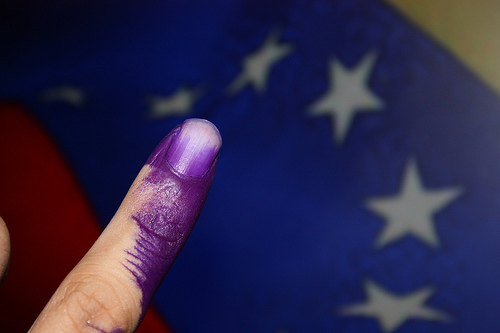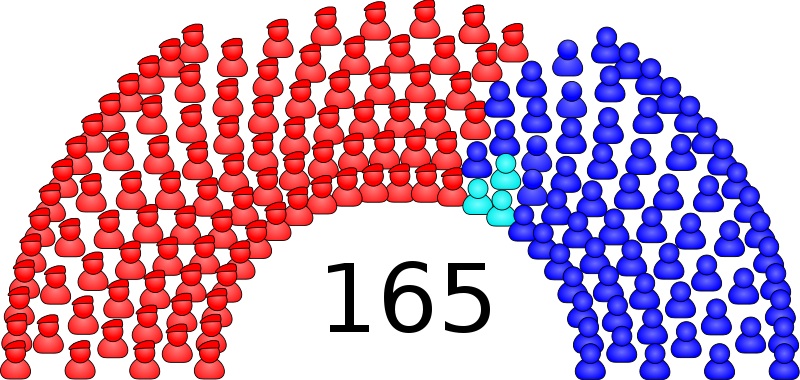Venezuela is a country divided with a population at odds over politics, however on September 26 it became a shinning example of civic responsibility. The vote became a tool of power for Venezuela’s citizens, with 66 % of the population voting, a record number for legislative elections. Earlier elections, boycotted by the opposition party who called on people not to vote, had seen a very low turnout. This gave Hugo Chávez the absolute majority in the National Assembly, a mistake, acknowledged later by opposition parties, as it allowed Chávez unprecedented power in Venezuela’s democratic system.
Days before voting began, on September 26, people used social networking sites to encourage friends and followers to vote. People’s Facebook statuses called for the people of Venezuela to vote like they had never voted before. Mobile internet connections and Twitter, popular among Venezuelans, was used to remind people to cast their vote. The call to vote continued until voting booths had closed. Political parties, running against each other, joined their supporters in calling for people to vote on mass. Voting figures showed that they succeeded, only 35% of the population abstained.

"Simple things with meaning: physical proof of having participated in the Parliamentary Elections 2010, against the backdrop of the Venezuelan flag because it’s about more than just political parties, I did it and will keeping doing it for my country” Image taken from Flickr user, @Ivanchild. Image used under Creative Common License for non-commercial use.
Blogger and Twitter user, Karelina Espinoza (@kareta) acknowledges her position as a “ni-ni,” someone who does not feel represented by either of the two political parties in Venezuela. As she states in her blog, ExplíkaMe! [es],
El pasado 26 de septiembre voté y participé cívicamente en un proceso electoral, como siempre lo he hecho, no porque me vea reflejada en algún bando sino porque creo que tengo en común con los candidatos y los demás electores el creer que podemos ser un país y no dos. Lo que quiero decir, con toda esta introducción, es que no nos hemos dado cuenta de las cosas que tenemos en común y que para ello debemos reconocer la existencia del otro, pero eso sí: sin obligarlo a aceptar nuestras posiciones, que creo es el error de quienes nos gobiernan (tanto en las regiones como a nivel nacional)
Thanks to voluntary organisations citizens were able to report voting irregularities at sites such as, votojoven.com [es] and dalepoderatuvoto.org [es], which, using SMS, Tweets, email and discussions via CoverItLive, did an excellent job of citizen journalism without censoring or filtering information.
Marco L. (@solo_marco) reports how the polling station operates in the capital of Venezuela, Caracas.
During the afternoon the streets of Caracas were empty. Venezuelans were at home awaiting the results of the election. The atmosphere was one of expectation. Twitter, once again, was the main source of information as television and radio were forbidden to predict election results. Some Twitter users leaked Exit Poll results as a way of getting around the ban but they did so responsibly: there were no re-tweets and, to avoid rumors spreading, it was agreed to tweet using the sign, #NoRumor. This strategy benefited not just the population but also citizen journalism.
Results:
Venezuelans were kept waiting for more than six hours after polling booths closed. This was despite a promise from the President of the National Electorate, Tibisay Lucena, that the first results would be announced after three hours. There was a tense calm while people waited for the results. Venezuelan comic and political commenter, Laureano Marquez [es], famous for laughing at himself in the face of adversity, opted to wait with the humor and optimism that characterizes him. Writing on Twitter he said, “We often ask ourselves if having a sense of humor detracts from the seriousness of it all. I think having a sense of humor helps us to find the funny side of a serious situation without losing the idea of how serious it is.”
While the waiting continued, President Chávez sent tweets from his Twitter account (@chavezcandanga). In one he said:
Bueno me han dicho que el pueblo viene pa Miraflores! Pues los espero aquí!! Pero ojo con la CONSOLIDACION!! Que nadie baje.la guardia!
The ‘Balcon del Pueblo’, Balcony of the People, has become a symbol of victory for President Chávez. Each election win he addresses his supporters from the Balcony in Miraflores, the governmental palace. His absence this time was significant.
On September 27 at 2.40am, Venezuelans finally started receiving news of the results. The first bulletin failed to inform them of the total number of seats won; nine seats were still waiting to be announced. Francisco Toro from the Caracas Chronicles, an English language blog, put together an interactive map on Google Maps, showing the final results of each region. Venezuelan newspaper, El Universal [es], also displayed results using an interactive form.
Reactions to the results have varied. Despite opposition parties, shown in blue in the chart below, obtaining a majority of 52%, they only secured 65 seats, while the governing party, shown in red in the chart below, had 48% and 98 seats. The Spanish newspaper, El País, [es] explained the results as such, “President Chávez and his supporters changed the law regarding voting and political participation in December 2009. As a result of these changes, less populated regions have now got a greater representation in parliament. Furthermore in these regions it takes less votes to elect an MP than in more populated states.” Francisco Toro shows how this legal reform ‘steals’ ten seats from opposition parties.
Mr Américo Hernández in the post “Venezuela. How great you are!” writing for the pro-government website, Aporrea [es], said,
Por supuesto que esta victoria del 26S es el comienzo del camino de Chávez rumbó a un nuevo triunfo como candidato presidencial de Venezuela 2012.Quiéranlo o no el gran ganador del 26S es el Presidente Chávez. Y eso de que su popularidad estaba por el piso es una mentira del tamaño del Kilimanjaro. Cómo mentirosos son los dueños de las encuestadoras que lo daban como perdedor. Por supuesto que la guerra a cuchillo en la oposición por la candidatura presidencial se intensificará en la intención que tienen algunos de los prospectos por abrogarse los votos que llevaron a los 61 diputados a la Asamblea Nacional. Por supuesto que esos diputados tienen que trabajar duramente y dejar la tiradera de piedras.
Elections results were also analysed by citizens. Twitter user and opposition supporter, Tutu Domínguez, gives her thoughts in her blog, Palabras más, Palabras menos [es]:
Otra cosa que tenemos que aprender, es que no hay peor guerra que la que no se lucha. Nos dejamos invadir por el sentimiento derrotista de que íbamos a unas elecciones trucadas. Y sí, no hay duda que lo de los circuitos electorales fue una trampa, pero lo sabíamos y no luchamos porque fuera distinto, al igual que hace 5 años dimos por perdida la Asamblea Nacional y nadie salió a votar. Ayer, con todo y el sentimiento de derrota, decidimos dar la pelea y el esfuerzo fue recompensado. ¿Que pudieron haber sido más diputados? Sí, estoy de acuerdo. ¿Qué absurdo que la mayoría de los votos estén representados por minoría en la Asamblea Nacional? Totalmente. ¿Que perdimos? ¡Jamás! El triunfo de ayer fue importante, porque además de mayoría, de diputados y de democracia, le devolvió a Venezuela algo que hacía tiempo habíamos dado por perdido y fue la esperanza.
Céser Guevara, official government blogger, in a post, “Neither am I happy nor will I tell lies”, published on his blog, César Guevara Irreverente [es],
No me place el resultado de las elecciones y por primera vez acerté cabalmente un pronóstico. […] Lograr dos tercios de los curules era imprescindible, no una opción, y al no lograrlo la revolución salió derrotada. Además el voto general nos fue adverso aunque haya virtual empate técnico, así que aquí hay doble derrota. ¿Está usted, camarada amigo, lo suficientemente obnubilado como para no aceptarlo?
Veamos ahora las causas de la derrota. Archiconocidas lo son: corrupción, alto índice delictivo, arbitrariedad jurídica, inflación con especulación como componente primario, pésimo estado de los servicios públicos por ineficiencia y falta de compromiso, y horrible política comunicacional que nunca hemos podido manejar inteligentemente. Si esta revolución se pierde, la pierden una sarta de incompetentes que no entienden lo que es hacer gobierno.
I’m not happy with the election results and for the first time I was right about something I predicted. Obtaining two thirds of the seats was a necessity not an option. In failing to achieve this, the revolution is defeated. The general vote was against us even though we have technically drawn, so here we have a double defeat. Are you, my comrade friend, too angry to accept it?
We will see now what the causes of the defeat were. They are well known, corruption, high levels of crime, juridical arbitration, speculation over inflation, pessimism over inefficient public services and a lack of commitment to them and a lack of communication from politicians, something that has never been managed intelligently. If the revolution loses, those who lose it will be a bunch of incompetent people who fail to understand what it is to run a government.
Edgar B, writing about the election results for Panfleto negro, in a post called “Ridiculous Results in a Ridiculous Election” said,
Resultados a las mas de 6 horas de haberse cerrado el proceso, tardanza más que incoherente y diabólica, deja ver, no sólo el grado de desprecio que tiene el ente comicial hacia los grupos bipartidistas existentes, sino la imbécil respuesta de los partidos acostumbrados a la limosna informativa oficial […]
Fuera del análisis político/místico opositor ¿Qué nos queda? Una elección donde nadie ganó realmente. Todos, absolutamente todos no sólo no ganaron, sino que perdieron (Y no es lo mismo no ganar, que perder). La oposición logro menos diputados de lo que les corresponde y el gobierno tienen reducido parcialmente su margen de acción (he allí la imbecilidad del asunto).
Waiting for over six hours was diabolical and it is difficult to understand how it took so long. There was a lack of respect shown by the Electoral Commission towards the two parties involved as well as the idiotic response of those parties used to towing the party line.
Apart from the political analysis what are we left with? An election where there was no winner. All of them, absolutely every single one of them not only did they not win but they all lost. (And it is not the same to not win than to lose). The opposition gained less MPs than they should have, according to results, and the government has seen its influence reduced.
The differing in opinion over the election results does not bode well for Venezuela’s democracy. As an example, journalist Andreína Flores (@andreina) questioned the president about voting distribution. The video [es], showing the conversation between the journalist and the president, has spread through blogs, YouTube and Twitter. The author of the blog, The Devil’s Excrement, comments on the video stating,“Andreina asks Chávez simple question, gets insulted, he never answered”.
Since the election many Venezuelans believe that change is coming. The 2012 elections are ever closer, and President Chávez, after 11 years in power, has a country with a 30% inflation rate, high levels of insecurity and a popularity rate standing at 42%. His message is clear, “We have to continue strengthening the revolution.” To win the next presidential elections what the opposition needs, and currently lacks, is a charismatic leader who will appeal to the masses; 11 years of Chávez have shown what is needed to win.








5 comments